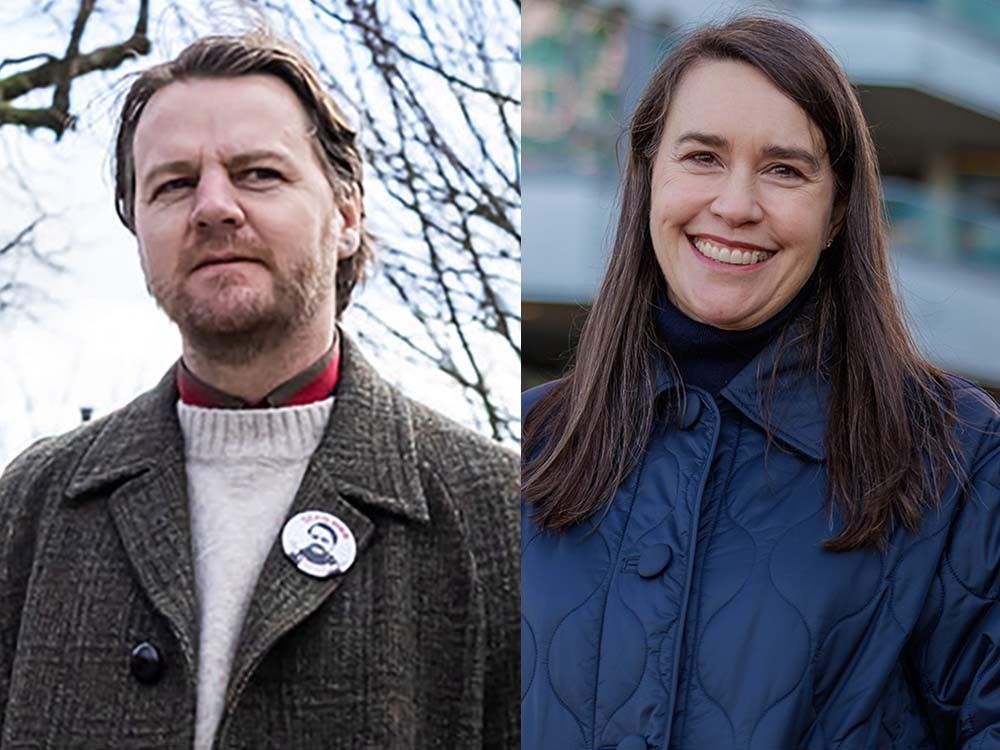Vancouver’s two new left-leaning councillors had strong support across most of the city, while candidates from the ruling ABC party, who placed a distant sixth and seventh, were weak even in traditionally centre-right neighbourhoods, according to a Postmedia analysis of the results of the April 5 municipal byelection. COPE’s Sean Orr and OneCity’s Lucy Maloney handily trounced 11 challengers in a race widely seen as a referendum on Mayor Ken Sim’s administration. A review of the number of votes cast for candidates at each of the 25 voting locations in the city reveals the widespread strength of support for COPE and OneCity, contrasting the weakness of ABC and a few vote-rich pockets for TEAM.
Orr was the top vote-getter with 34,448 votes, getting the most votes at 14 polling stations, most of them in the city’s east side plus False Creek Community Centre on Granville Island, Marpole-Oakridge in the city’s southwest, and the West End in downtown Vancouver. Maloney, who received 33,732 votes, got the most ballots at seven polling stations, including west side ones like Vancouver City Hall, Olympic Village (Creekside Community Centre), Riley Park (Hillcrest and Douglas Park community centres) and Yaletown (Roundhouse Community Centre). Orr and Maloney alternated first and second place positions at 21 polling stations, winning at least two-thirds of votes cast at six of them.

Third-placer Colleen Hardwick and fellow TEAM candidate Theodore Abbott did well on the west side and along the Broadway corridor. Hardwick, a former councillor and mayoral candidate, and Abbott campaigned heavily on density concerns and revisiting the Broadway plan. They won the top two spots at Dunbar Community Centre, Kerrisdale, Kitsilano and West Point Grey but did not manage to get more than 50 per cent of total votes cast at those four locations.
Three of those sites — Kits, Kerrisdale and Dunbar — were among the top five sites with the highest voter turnouts. The other two busiest sites — West End and Trout Lake — went to Orr. In contrast, the two ABC candidates had a dismal showing across the city.
Ralph Kaisers and Jamie Stein — whose combined votes added to roughly half of Orr’s — polled best with 774 for Kaisers in Kerrisdale and 811 votes there for Stein. But neither won Kerrisdale or any other poll in the city. Kaisers, the head of the Vancouver police union, had fewer than 200 votes in 12 polls and Stein, a tech business leader, fewer than 200 votes in 10 polls.
Voters often use byelections to send a message and it’s not rare for incumbent parties to get hammered in the process, said Mario Canseco of polling firm Research Co. “It’s a reaction to how the city has been doing,” he said. “I don’t think it’s a full endorsement of what COPE and OneCity are doing, but there’s a certain level of tiredness with how the government is running things, and this is one way it manifests itself.
” Conditions are vastly different now than in 2022 when Sim’s ABC party swept to power on a pledge to fix the city and improve public safety, winning majorities on council, school board and park board. “To knock on doors now when the situation has not improved in the minds of people is much more complicated,” said Canseco, adding he was surprised to see ABC go all-out with the byelection campaign. The party could have decided to sit out the race to replace two vacant councillor seats as it would not have changed the balance of power at city hall, but didn’t and got clobbered.
“Now you’re preparing yourself for 2026 with these two significant losses hanging over your neck,” he said referring to the next general municipal election. Even on the west side, where voters traditionally leaned right-of-centre, support for ABC was thin, with Orr and Maloney performing better than Kaisers and Stein in those neighbourhoods. It was also a bad day for the Green candidate vying to replace Adriane Carr on council.
Annette Reilly’s top poll was in the West End where she received 957 votes but collected fewer than 500 votes in 17 of 25 polls, placing fourth overall. Approximately 67,962 ballots were cast on election day, with a voter turnout of about 15 per cent. The higher-than-average turnout caught the city off guard, with voters lining for up to three hours at understaffed polling stations.
Vancouver’s city manager Paul Mochrie called the waiting times “unacceptable” and said they reflected “flawed planning assumptions” for the byelection. Vancouver voters could vote in any voting location across the city on byelection day. Most people tend to vote at locations close to home, although long lines could have caused voters to try different locations.
[email protected] RelatedVancouver byelection results a blow for Mayor Ken Sim's ABC party'We got our butts handed to us:' ABC Vancouver pledges to learn from byelection defeatVancouver election office says record high voter turnout reason for long lineups for byelection.
Politics

Vancouver byelection: COPE, OneCity led the east side polls, while ABC had little support across the city

Sean Orr topped the polls at 14 locations, most of them on Vancouver's east side














